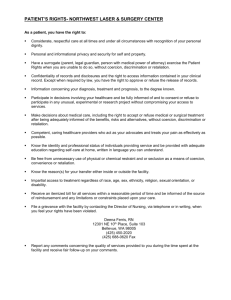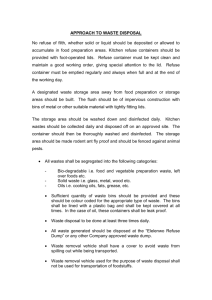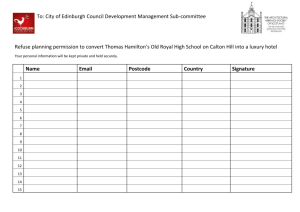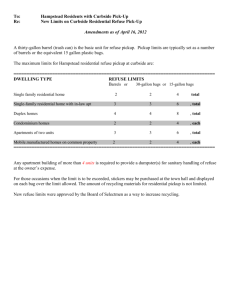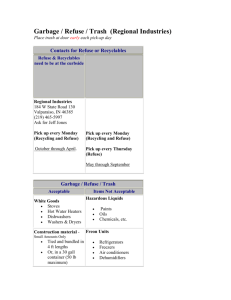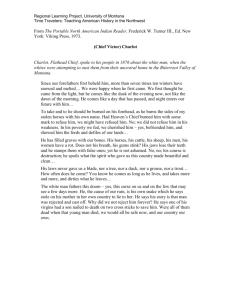My Advance Decision to Refuse Treatment
advertisement
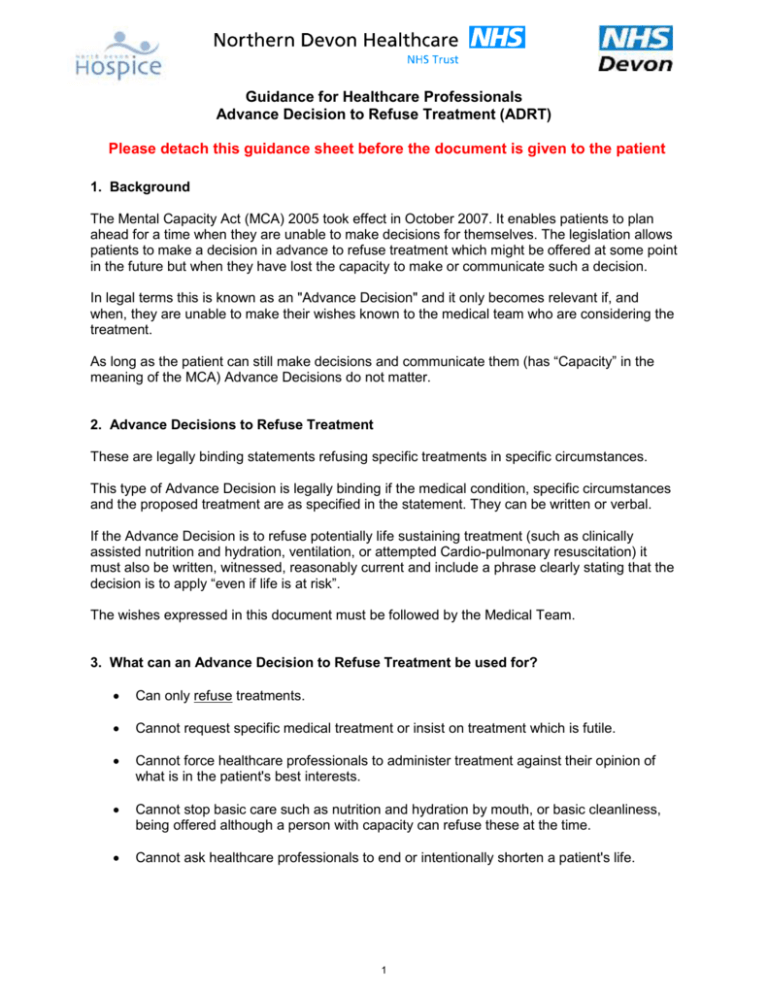
Guidance for Healthcare Professionals Advance Decision to Refuse Treatment (ADRT) Please detach this guidance sheet before the document is given to the patient 1. Background The Mental Capacity Act (MCA) 2005 took effect in October 2007. It enables patients to plan ahead for a time when they are unable to make decisions for themselves. The legislation allows patients to make a decision in advance to refuse treatment which might be offered at some point in the future but when they have lost the capacity to make or communicate such a decision. In legal terms this is known as an "Advance Decision" and it only becomes relevant if, and when, they are unable to make their wishes known to the medical team who are considering the treatment. As long as the patient can still make decisions and communicate them (has “Capacity” in the meaning of the MCA) Advance Decisions do not matter. 2. Advance Decisions to Refuse Treatment These are legally binding statements refusing specific treatments in specific circumstances. This type of Advance Decision is legally binding if the medical condition, specific circumstances and the proposed treatment are as specified in the statement. They can be written or verbal. If the Advance Decision is to refuse potentially life sustaining treatment (such as clinically assisted nutrition and hydration, ventilation, or attempted Cardio-pulmonary resuscitation) it must also be written, witnessed, reasonably current and include a phrase clearly stating that the decision is to apply “even if life is at risk”. The wishes expressed in this document must be followed by the Medical Team. 3. What can an Advance Decision to Refuse Treatment be used for? Can only refuse treatments. Cannot request specific medical treatment or insist on treatment which is futile. Cannot force healthcare professionals to administer treatment against their opinion of what is in the patient's best interests. Cannot stop basic care such as nutrition and hydration by mouth, or basic cleanliness, being offered although a person with capacity can refuse these at the time. Cannot ask healthcare professionals to end or intentionally shorten a patient's life. 1 4. Preparing an Advance Decision Advance Decisions to Refuse Treatments which are life-sustaining must be in writing, and other advance decisions or preferences are much clearer if written. The document provided with these notes has been designed by Healthcare Professionals across the South West Peninsula. It is based upon documents used in other areas of the country. Patients may choose to use this document, but are not restricted to doing so. Any written Advance Decisions should be signed. If a patient cannot physically sign the form, it will need to be signed by someone appointed by them and signed in the presence of a third person who is preferably independent. This third person should witness the signature. A specific Advance Decision to Refuse Treatment may not be valid if there is any ambiguity or uncertainty and would, instead, be regarded as an “Advance Expression of Wishes”. (See section 11). To ensure that an Advance Decision is valid, and will be followed by doctors and carers, it should follow the guidance outlined below: An Advance Decision to Refuse Treatment should: Show that the patient was aged over 18 and competent when it was drawn up. Show that the patient had anticipated their current medical condition. Take account of their current home and family circumstances. Take account of any other relevant medical conditions. 5. Using an Advance Decision to Refuse Life-Sustaining Treatment If a patient uses an Advance Decision to refuse certain life-sustaining treatment it must: Be in writing. Be clear and specific about the treatment in question and circumstances under which it is to be refused. Be signed by the patient in the presence of a witness or, if they cannot sign it themselves, it should be signed by someone they have appointed to sign on their behalf in the presence of a witness. Be signed by the witness (it is strongly advised that the witness is not a close relative or beneficiary of the patient’s will). Include a statement which verifies that this Advance Decision will apply “even if their life is at risk”. For example: An ADRT which said “If I get really bad then just switch my life-support machine off” would not be specific enough to be considered valid and would not in itself, allow withdrawal of treatment. It should be considered very useful background information for clinicians in helping them make an overall “best interests” decision. However, if a patient with motor neurone disease was being fed through a PEG tube and they had a current witnessed, signed advance decision that said: 2 “If I become unconscious for any reason and am not expected to regain consciousness after 24hours - I wish nutrition and hydration by my PEG tube to be withdrawn. Analgesia and other medications for my immediate comfort can still be given but not antibiotics. This is to apply even if my life is at risk.” then their medical team would be obliged to comply with the ADRT. 6. How should a doctor decide whether an Advance Decision to Refuse Treatment is valid? Doctors are obliged to consider overall benefit (to act in best interests) and consider a number of important factors when considering the validity of an Advance Decision to Refuse Treatment. These include: Has medical treatment changed significantly since the Advance Decision was made and, therefore, is a good outcome now possible? Is there any evidence that the patient has drawn up the Advance Decision under significant duress? How recent is the original/revised document? Has any recent action of the patient suggested a change of mind? For example refusing all treatments when the Advance Decision was originally made but then agreeing to a course of treatment previously declined. If the treating healthcare team is in any doubt about validity of an Advanced Decision to Refuse Treatment, then they can ask for a “second opinion” by a senior clinician and may need to consider asking for legal advice. 7. Who should discuss an Advance Decision with a patient? If a patient decides that they wish to proceed with an Advance Decision it would be advisable for them to discuss it with at least one of the medical staff caring for them. This may be their GP, Medical Consultant or Palliative Care Consultant. The nursing team caring for a patient will also play a valuable role in helping patients think about Advance Decisions to Refuse Treatment. It is also very helpful for the patient to discuss these preferences with the people looking after and supporting them. This discussion with family, friends or carers may be the most important and useful outcome of any advance care plan. 8. Making sure that an Advance Decision is acted upon It is the patient’s responsibility to ensure that the Healthcare Professionals treating them are aware of the existence of any Advance Decision. Patients are strongly advised to take all reasonable steps to ensure that their GP, other healthcare professionals and your friends, family and carers are aware of the Advance Decision and have access to a copy that they can refer to when necessary. 3 9. Amending or revoking an Advance Decision People have the right to amend or revoke their Advance Decision at any time. This can be in writing, word or deed. If a patient is seen to act in a manner which contradicts their Advance Decision, it will be taken as an implied revocation of it. It is important to remember that it is the patient’s responsibility to ensure that the Healthcare Professionals treating them are aware of the amendment or revocation. Advance Decisions should be kept under frequent review. The longer the time since the decision was made or reviewed, the more questionable the validity of it may become. In particular, we should encourage patients to review any Advance Decision whenever there is a change in the circumstances of their medical condition or treatment. 10. Advance Decisions and a Power of Attorney It is also possible for patients to use a Power of Attorney to appoint someone to take decisions on their behalf regarding their medical treatment, if they become unable to do so. Patients can do this by setting up a written personal welfare Lasting Power of Attorney (personal welfare LPA) which appoints a named individual to take certain decisions, which are specified by the patient. The appointee must register the personal welfare LPA with the Office of the Public Guardian and act in the patient’s best interests at all times. The personal welfare LPA allows the patient’s appointee to refuse, on their behalf, any treatments which have been specified in the document. It does not, however, empower the appointee to demand treatment on the patient’s behalf. Personal welfare LPA’s may be useful, but staff should be aware that there is a charge to register this document. Note: A personal welfare LPA created after an Advance Decision was set up will override the Advance Decision if it relates to decisions regarding the same conditions or treatment. 11. Advance Expressions of Wishes or “Preferred Priorities for Care” Many patients may not feel able to be specific about what treatments they would like to refuse in the future. Where patients have general wishes or goals for the future, they should be referred to the Preferred Priorities for Care information. This is not a legally binding document and indeed may be verbal or written very informally. It may contain very helpful information about, for instance, where a patient wants to die, who they would like to have at their side but is not about refusing specific treatments. 4 Health Care Professionals should take account of wishes expressed in this way when deciding whether treatment or other care is in the patient’s best interests. This may form part of an Advance Care Plan. The greatest value of this plan is in the continuing discussion that it produces between the patient and the people, professional and others, who care for them. Further Reading More information regarding personal welfare LPAs is available from the Department of Health’s website (www.dh.gov.uk) and from your GP, Consultant or Solicitor. The Office of the Public Guardian also has a very useful website available: www.publicguardian.gov.uk The General Medical Council has issued recent guidance: Treatment and Care towards the end of life: good practice in decision making. 2010. www.gmc-uk.org The full Mental Capacity Act 2005 and Code of Practice 2007 are available online: http://www.opsi.gov.uk/acts/acts2005/ukpga_20050009_en_1 5 BLANK PAGE 6 My Advance Decision to Refuse Treatment My name My date of birth My address Any distinguishing features in the event of unconsciousness My NHS number My telephone number What is this document is for? This Advance Decision to Refuse Treatment has been written by me to specify in advance which treatments I don’t want in the future. These are my decisions about my healthcare, in the event that I have lost mental capacity and cannot consent to or refuse treatment. This Advance Decision replaces any previous Advance Decision I have made. Advice to the reader I have written this document to identify my Advance Decision. I would expect any healthcare professionals reading this document in the event I have lost capacity to check that my Advance Decision is valid and applicable, in the circumstances that exist at the time. Please check; Please do not assume I have lost capacity before any actions are taken. I might need help and time to communicate. If I have lost capacity please check the validity and applicability of this Advance Decision. This Advance Decision becomes legally binding and must be followed if professionals are satisfied it is valid and applicable. Please help to share this information with people who are involved in my treatment and care and need to know about this. This Advance Decision does not refuse the offer and or provision of basic care, support and comfort. I am writing this document at a time when I have capacity, and am fully aware of the potential consequences of any refusal of treatment, including my life being shortened as a result. I am able to understand, retain and weigh up all of the information relevant to this Advance Decision and am able to communicate my decision. 7 REFUSAL OF LIFE SUSTAINING TREATMENT I wish to refuse treatment as below and I understand that my decision could result in the loss of my life and wish this Advance Decision to apply in those circumstances. My Signature I am unable to sign this form myself, my nominated person is: Name Relationship Address Telephone Number Signature Date Signed in the presence of: Name Relationship Address Telephone Number Signature Date My Advance Decision to Refuse Treatment I wish to refuse the following specific treatments :- In these circumstances :- e.g. artificial (mechanical) breathing machine in intensive care e.g. if I have had a severe stroke with no chance of recovering consciousness 8 My Name NHS No. I would like these people to be involved in decisions about my care Contact 1 Name Relationship Address Telephone Number Do they have a personal welfare Lasting Power of Attorney: Yes/No Contact 2 Name Relationship Address Telephone Number Do they have a personal welfare Lasting Power of Attorney: Yes/No I have discussed my Advance Decision to Refuse Treatment with (e.g. name of Healthcare Professional) Name Profession / Job Title Contact Details Date I give permission for this document to be discussed with my relatives / carers YES NO (please circle one) My General Practitioner is: (Name) Address Telephone My GP has a copy of my Advance Decision to Refuse Treatment: 9 Yes/No My Name NHS No. The following list identifies which people have a copy and have been told about my Advance Decision to Refuse Treatment (and their contact details), e.g. GP, Ambulance Service, Hospice Team, District Nursing Team, Out of Hours Service, Solicitor, family members, Hospital Consultant, paid carer. Name Relationship Telephone Number Further Information (Optional) I have written the following information that is important to me. It describes my hopes, fears and expectations of life and any potential health and social care problems. It does not directly affect my advance decision to refuse treatment but the reader might find it useful. I have also completed a Preferred Priorities of Care document: 10 Yes/No

